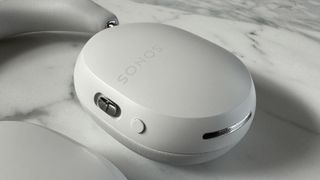When Sonos announced the Ace – the audio company’s much-anticipated first foray into headphones – I was intrigued to say the least and wondered if they could lay claim to being among the best headphones. I have a number of Sonos speakers at home and so certainly had a soft spot for the brand, despite the recent app issues that have plagued some users.
But as an over-ear pair of headphones, there was only a certain amount of anticipation and hype I could give them. I’ve never been someone who enjoys wearing over-ear headphones on a regular basis. Whilst I appreciate and can certainly agree they’re capable of delivering incredible sound, the pairs I’ve tried out have often been uncomfortable, at least for long periods of time. They make my ears too hot and sweaty; they ruin my hair (it’s ok to be vain, right?) and I personally find in-ear headphones to be superior both in terms of sound and noise cancellation.
The Sonos Ace has completely changed my perception.
I was invited to be among the first in the world to experience the Sonos Ace headphones – the very first pair of headphones from the iconic multi-room audio specialists – at a special press event in Sydney, Australia, and I didn’t leave disappointed. In fact, I left the event thinking I may have found the first ever pair of over-ear headphones I could actually see myself wearing.
Four months since the official launch, I’ve worn them every single day.
Thanks to a lightweight build, the use of plush memory foam and vegan leather and the aforementioned hinge mechanism, the Sonos Ace are some of the most comfortable headphones I’ve ever worn.
Let’s talk about fit, baby
The main cause of my epiphany is how Sonos Ace fit on my head. Over-ear headphones are a totally different beast to their in-ear counterparts. The latter usually ship with various sizes of ear tips to help individual users find the most snug fit. Over-ear headphones don’t have this luxury, instead they have to adopt a one-size-fits-all approach, which is no easy feat.
Where the Sonos Ace headphones excel for me is their intuitive hinge mechanism. This mechanism is stylishly implemented – it’s chromed to provide a contrasting accent against the soft white or black colour of the headphones, and is integrated inside the ear cup as opposed to being visible on the outside. The hinges allow both ear cups to pivot on both a vertical and a horizontal axis, as opposed to some other pairs whose hinges just swivel from side to side. In my experience, the Ace’s hinge mechanism means I get a snug fit every single time, as the ear cups are able to ‘mould’ to the contours of my face and I expect anyone else who wears them will get the same result.
Admittedly, the Sonos Ace headphones aren’t the only ones to provide this kind of adjustment. The Apple AirPods Max – with which the Sonos Ace have drawn a number of similarities in the looks department from onlookers – employ a similar, pivoting ear cup design. But Apple’s set of premium headphones weigh 73g more than the Sonos Ace, and while the Cupertino cans have a knitted mesh headband to help alleviate that weight, in my opinion it doesn’t quite do enough. In my brief experience wearing the AirPods Max, I simply found them too heavy to wear for long periods. I’m sure current owners will disagree, and that’s perfectly fine, but I haven’t encountered any such issues with Sonos’ first headphone attempt.
Slim pickings

Did I mention I could be considered vain earlier? Well, another facet in my disdain for over-ear cans is their (usually) large profile. I’m personally not a fan of rocking a major extension of my ears while walking down the street. The best similarity I can provide is that I feel I look like Makka Pakka from the children’s TV show In the Night Garden…gormless expression and all.
Sony, Sennheiser, and even Apple, I would argue, are all guilty of bestowing large, protruding ear cups to their headphone designs. Sonos, however, has managed to implement a much slimmer profile which I find much more attractive. It is still plainly obvious I’m wearing a pair of over-ear headphones, but their slim profile cuts a less noticeable silhouette. To me it screams premium, and the soft white finish of the pair I received is a smart choice by the audio brand. Sonos could have opted for the white finish of its speakers, but in the words of its director of design, it would have looked too “techie,” the soft white finish therefore is an excellent substitute.
A fan of physical touch
Whatever happened to physical button controls? Aside from a power button, most pairs of modern over-ear headphones employ various forms of swipe gestures and taps to control playback. It’s meant to be intuitive and perhaps ‘cool’, but in my experience I’ve found it to be a bit of a gimmick. Tapping generally requires you to tap on an exact point on an ear cup. But since you can’t physically see what you’re doing, it rarely results in the desired action the first time. Swiping to adjust volume or track I have found to yield more successful results, but at the cost of looking a bit silly.

The Sonos Ace uses only physical buttons for all controls, and has cleverly created a single button to handle seven different actions. The Content Key on the right ear cup can play or pause a track, be used to skip or go back to the previous song you were listening to, adjust volume levels, and answer or reject calls.
Also on the right ear cup is a button to adjust noise cancellation settings, summon the voice assistant of your device or to enable the soon-to-be-launched TrueCinema feature, which swaps audio between the Ace and a Sonos Arc soundbar. On the left ear cup is a power button.
Three buttons. 11 actions. I’d say that’s mighty impressive.
Sounding out
Despite our Sonos Ace review revealing they’re not the absolute last word in sound quality compared to similarly priced pairs such as the Sony WH-1000XM5 or Bose QuietComfort Ultra – an opinion I have to ultimately agree with having heard these rivals – I still find their bass to be great and I have no issues with the noise-cancellation on offer. I’ve worn them at home while my partner is sitting beside me on a work video call, and I can’t hear him or the people he’s talking to at all. Sure, some noise from trains can seep in when standing on a platform, but this is something I experience with numerous other pairs, so it’s not a mark against the Sonos in my opinion
Movie time
The trump up the Sonos Ace’s sleeve is its ability to ‘talk’ to any of Sonos’ current range of soundbars and swap the audio from your TV to the headphones. I have the Arc soundbar at home, and there have been a few occasions where I’ve needed to swap the TV audio so as not to wake my partner. The process works seamlessly and the Ace’s ability to deliver spatial audio with head tracking really does need to be heard to be believed. Dialogue comes through wonderfully clear and bass impact is just the right side of low and powerful, resulting in a truly cinematic experience.
What’s most important to you?
Here at TechRadar, we of course have to judge each product on its individual performance. But occasionally there can be products that, while are perhaps not the outright best-in-class, they deliver in ways that some people like. After all, if you listen to a pair of headphones or a pair of speakers and you like what you hear, then all the reviews in the world shouldn’t deter you.
That’s what I’ve found with the Sonos Ace. I know they’re not the absolute best-sounding pair of headphones I’ve ever heard, but they are so so comfortable that it’s a sacrifice I am more than happy to make.
Conclusion: The Sonos Ace headphones have pleasantly surprised me with their comfort, design, and intuitive controls. While they may not be at the top of the game in terms of sound quality compared to some competitors, their overall user experience and convenience make them a standout option for anyone looking for a comfortable and stylish pair of over-ear headphones. If you’re in the market for a new audio experience, definitely give the Sonos Ace a try.
For more trending news articles like this, check out DeFi Daily News.



















